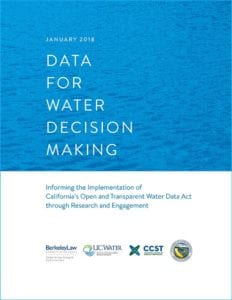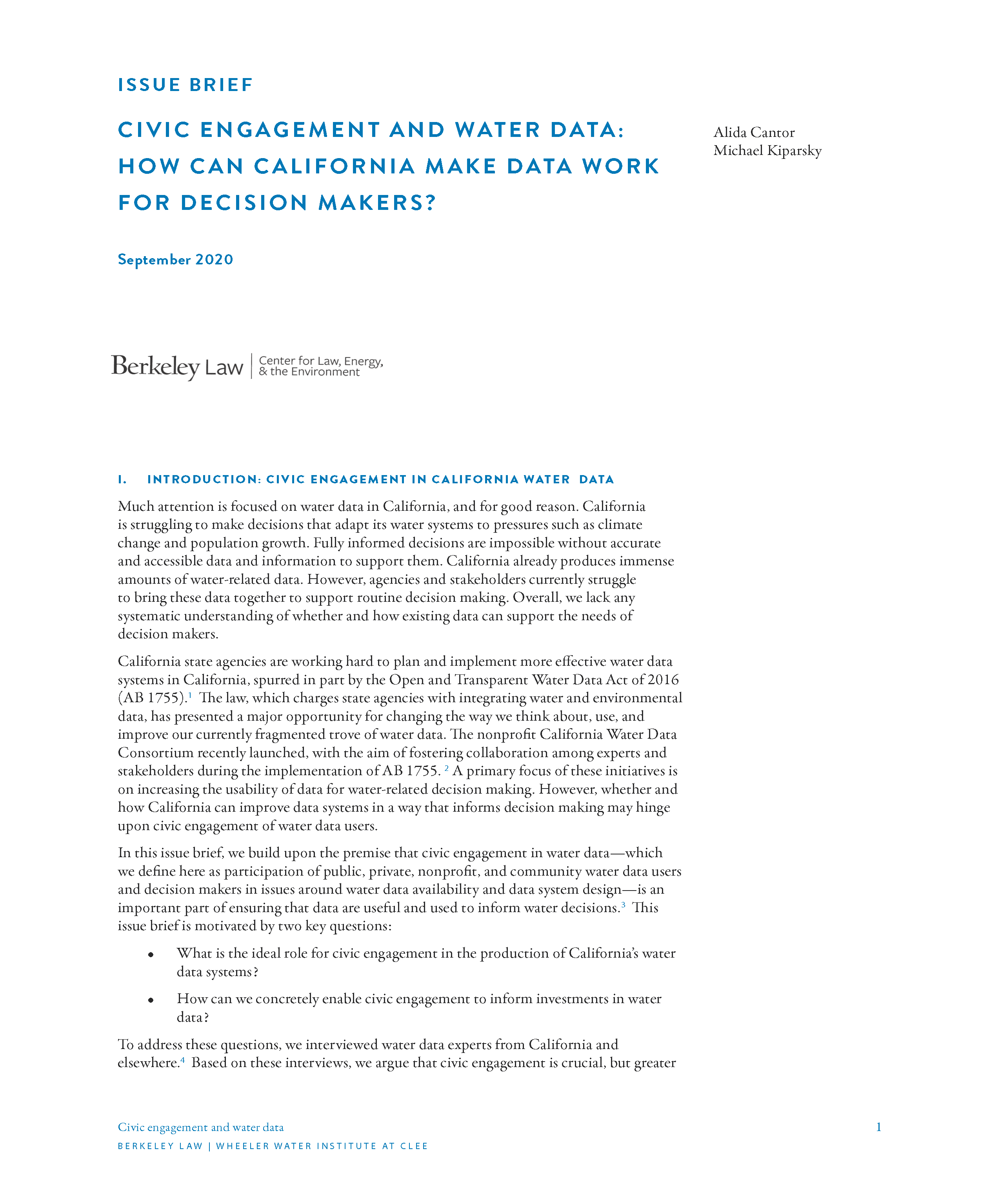Informing the Implementation of California’s Open and Transparent Water Data Act through Research and Engagement
 January 2018
January 2018
A lack of data and information has limited our ability to understand, let alone better manage, all aspects of our water resources. This report supports California’s efforts to develop modern water data systems. It argues that simply providing more data is not enough, and that generating useful and useable information hinges on the development of data systems based on end users’ needs. The report describes lessons learned from a process of stakeholder engagement focused on defining and clarifying uses of water data, and how knowledge of these uses can inform the development of water data systems.

|
Why data?
California’s water data currently falls far short of the fundamental goal of being complete and usable—that is, readily available in formats that suit users’ needs and are useful for making the decisions at hand. With better and more usable data informing water management, California’s existing water resources could better meet urban, agricultural, ecological and industrial needs.
California’s 2016 Open and Transparent Water Data Act (AB 1755) provides an important opportunity for improving the state of water data in California. The bill charges state agencies with integrating currently fragmented water and environmental data systems. However, the law itself does not ensure increased usability of data for decision making, which require a broader rethinking of data systems and the decision making contexts in which they are embedded.
This report makes a case for anchoring the development of data systems in the needs of end users. It describes a process for engaging stakeholders in the assessment of data needs through the development of use cases, and summarizes lessons emerging from the process. In concert with other efforts, this report contributes to a viable vision for the future of water data in California, as noted in the following recommendations.
Considerations for an open and transparent water data system
If the state of California is to successfully navigate its current opportunity to develop an open and transparent water data system that effectively informs decision making, it should incorporate the following considerations (discussed in further detail in the report) into its planning.
- To ensure relevance, an understanding of the way data is used in decision making should guide the development of data systems.
- A wide variety of data must be highly accessible and interoperable to serve many different contexts.
- Data gaps and limitations take a variety of forms, including availability, accessibility, and usability, and will need to be filled in distinct ways.
- For California water, an integrated data system will need to connect data from multiple independent sources, while keeping those independent systems as autonomous entities.
- A water data system must address needs for data at multiple resolutions, and in multiple distinct forms and formats.
- Ultimately, the goal is not only data provision, it is enabling the production of information (data that have been processed in such a way as to be useful).
- Engagement between data system developers and end users is, ideally, an ongoing and iterative process.
- Basing water data on principles of usability and stakeholder engagement requires robust cyberinfrastructure, good governance, and stable funding.
Developing data and information in a useful and usable form requires not only resources, it requires substantial commitment to the processes of building relationships and working with stakeholders. The current momentum and collaborative efforts between agencies and stakeholders are encouraging progress towards actualizing data-driven decision making for California water.
Download the Report:
Download the Full Compilation of Use Cases Developed for this Report:
Data for Water Decision Making – Use Cases (Jan 2018)
See Our Legal Planet Blog Post:
Progress on California Water Data (Mar 1, 2018)
See Our Op-Ed in The Sacramento Bee:
Advanced Data Would Improve How California Manages Water (Feb 8, 2017)
See the Draft Strategic Plan and Preliminary Data Protocols Developed by DWR:
For More Information:
Contact Mike Kiparsky, Director, Wheeler Water Institute, Center for Law, Energy & the Environment
This project is part of the UC Water Security and Sustainability Initiative and supported by the University of California Office of the President